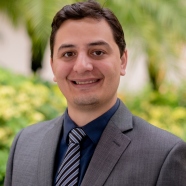Dell Med Names Chris Moriates Assistant Dean of Healthcare Value
With a focus on improving care and lowering costs, the new Dell Medical School at UT Austin has tapped Chris Moriates, MD, to become Assistant Dean of Healthcare Value and Associate Professor in the Department of Internal Medicine. In this first-of-its-kind position for a medical school – one that bridges medical education and clinical care – Dr. Moriates will create an innovative, value-based care curriculum for undergraduate, graduate and continuing medical education, and build a robust value improvement program that engages providers across Austin’s healthcare community.
Prior to joining the Dell Medical School, he was Assistant Professor in the Division of Hospital Medicine at the University of California, San Francisco (UCSF), where he led the UCSF Center for Healthcare Value’s Caring Wisely program, the Division of Hospital Medicine High-Value Care Committee and the internal medicine residency’s Cost Awareness curriculum.
“Chris established the first solid curriculum for teaching about costs and value in healthcare, and he did it as a resident. That same curriculum is used nationally and evolved into the textbook on the subject,” said Dean Clay Johnston. “We are thrilled to have him join our team.”
Dr. Moriates is currently Director of Implementation Initiatives at Costs of Care, a global non-profit organization curating clinician insights that drive better care at lower cost, and co-chairs the annual Costs of Care/American Board of Internal Medicine (ABIM) Foundation Teaching Value & Choosing Wisely Competition. He also previously worked with the American College of Physicians (ACP) on its national High-Value Care Curriculum.
Chris also took the time to answer some questions about his new role:
What do you mean when you talk about “healthcare value”?
We all want to provide and receive healthcare that is as safe, effective and humanizing as possible, and there is general consensus that on a national scale we can improve on all of these measures. But another serious problem is the out-of-control cost of health care. In some cases, the cost of care is bankrupting individuals and draining resources from societal priorities such as education, infrastructure, business and meaningful wellness programs. Healthcare value pulls together all of these elements. It involves providing the highest quality care and the best health outcomes – all at lower cost. From our patients’ perspective, value means integrating things like patient safety, quality of care, a positive overall experience and affordability. What could possibly be a better goal than that?
Tell us a little bit about your background and experience, in particular your work integrating value-based education into medical training.
During residency training, I took an intensive course on health curriculum design and became interested in creating a curriculum for my colleagues that would enhance our current training. I reflected on my own experience and recognized that no one seemed to be talking about costs. It was also clear that there are a lot of things we seem to be doing in healthcare for no reason, such as tests and treatments that don’t make sense, but we still do them. I realized that the emerging concept of healthcare value brought these things together, and that led me down the rabbit hole of exploring healthcare costs, quality, and value. And along the way, I came across many compelling patient and clinician stories, which got me even more interested.
I developed a simple curriculum, which included working with interns to review hospital bills from our patients. We found the gaps between what we should be doing (based on evidence) and what we actually do, and we all gasped at the associated costs. That grew into a regular conference series at UCSF. From there, I became involved in national efforts, including the opportunity to contribute to the ACP’s High-Value Care Curriculum and to work with the ABIM Foundation on efforts related to their Choosing Wisely campaign. I collaborated with two of my colleagues from the global non-profit, Costs of Care, and authored a textbook, “Understanding Value-based Healthcare.”
You will be working to integrate value-based care into education and clinical programs. Can you provide some examples of what that might look like?
Understanding the concepts of value-based care is necessary, but it is not enough. These ideals need to be deeply woven into how healthcare is actually practiced. Thus, it seems to me impossible to imagine designing a curriculum that is not inextricably linked to programs that help create an environment where trainees and practicing clinicians actually walk the talk of healthcare value.
My vision involves creating adaptive, interactive modules that will explore and teach the concepts necessary to understand healthcare value, and we will support that work with programs that engage frontline clinicians in the process of improving care delivery. There is already an entire community of fantastic physicians and nurses in Austin and they know much better than I do about the real opportunities specific to their environment. We will be asking these clinicians to help identify opportunities for improvement and then we will work to provide the support, infrastructure, data and process improvement expertise to help us all do better together. A concrete example that we implemented at UCSF involved reducing unnecessary blood transfusions in our hospital. This sort of program is a win-win-win as it saves precious resources and costs while also being safer for patients.
The medical school has an unprecedented partnership with our community. How will your work benefit the people of Austin and Travis County?
What I absolutely love about this new opportunity is that it is clear who we are accountable to: the people of Travis County. We will judge the success of our work by our ability to provide our community with better care resulting in measurably better outcomes at lower cost.
What attracted you to the Dell Medical School?
There is a palpable energy right now in Austin and at Dell Medical School. It is a place that seems unafraid to be bold. From my perspective, this is an unprecedented opportunity to really get it right and set an example for other communities and health systems. The people that have already come to Dell Med are remarkable leaders who have accomplished great things, and just by virtue of them deciding to leave behind established careers to join a new medical school tells you they are brave and committed to change. That’s the type of team I want to join.

